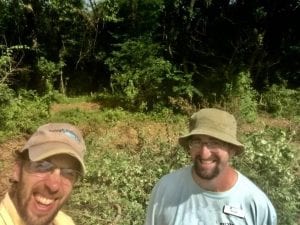Now that summer is well underway, so is our weekend edition of Weed Warriors! This is a new volunteer group dedicated to managing the spread of invasive species throughout Irvine’s 210 acres. We have about a dozen volunteers dedicated to this growing team and are always looking for more to join. We meet on Tuesday and Thursday mornings as well as Saturday mornings (9-1am) and afternoons (1-5pm).
Invasive species are animals or plants from elsewhere that tend to spread quickly and disrupt the delicate ecological balance in an ecosystem. Other terms are also used for invasive species, such as ‘non-native’, ‘non-indigenous’, ‘exotic pests’, ‘noxious weeds’ and others.
While not all species from elsewhere are problematic, the species considered invasive wreak havoc on our native species. Some traits of invasive species include fast growth, rapid reproduction, the ability to disperse seeds broadly and in high quantities, being highly adaptable, and to tolerate many environmental conditions. Often it out-competes other species in the area for space, light, nutrients, food, water or other resources. In addition to taking over a community, it can damage the environment by releasing harmful chemical compounds and even affect the behavior of herbivores or other species in the food web.
On our first weekend on June 30, we focused on three of the Top Ten Invaders at Irvine: 1) Oriental Bittersweet (Celastrus orbiculatus), Multiflora Rose (Rosa multiflora) and Privet (Ligustrum spp.). Both are pulled by hand and it’s important to wear gloves! Multiflora rose has thorns all the way down its stem, even when very young. Both have to have their roots removed so as to prevent regrowth. With Oriental Bittersweet all plant matter is composted so that there is minimal chance that it will regrow. Its roots grow very quickly in all directions as it sends feelers out to look for places where it can send up another shoot. Shoot density can be quite high in some areas!
Our Weed Warrior team did a great job tackling some of these invasive species, and we can’t wait to get them back into the field next week!

